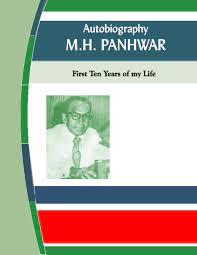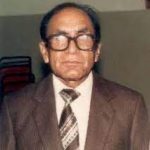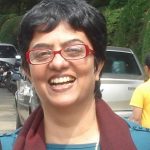
Excerpt from the memoirs of MH Panhwar (192-2007), who specialized in groundwater development, earthmoving, agricultural machinery, water logging, salinity control drainage and agriculture.
Saaz Aggarwal
I was less than five years old when I was watching a Hindu shopkeeper of our village weighing butter in the house next door to ours.
Ghulam Rasool , some nine years older than me, was standing in that house and he asked me to ask the shopkeeper: “Hoonda will you eat cow’s meat”?
I repeated the words. Hoonda left his weighing scale. He looked at me with anger. I was frightened and ran towards Ghulam Rasool’s house, but the thorny hedge prevented me from entering. Hoonda felt sorry for me. He picked me up, brought me out from the thorny bush and said: “Do not ever say that again”.
The next time he came to our house, I hid behind the sacks of grain. After he left, my mother told me: “He is a Hindu and they worship the cow as a mother. For them, slaughtering a cow and eating it is like you killing me and eating my flesh.”
I was horrified. I wanted to apologize. I had learnt how to offer an apology from my paternal uncle. When I played with his belongings, he would make me touch his feet and then stand waiting with my hands folded until he said “I forgive you”.
So I stopped outside the Hindu merchant’s shop and when I saw Hoonda coming out, I touched his feet and stood with folded hands before him. He immediately picked me up embraced me, gave me lot of sweet stuff to eat and told me “Now you are a good boy, but Ghulam Rasool is naughty. It was he who made you say those words.”
It was a lesson to respect other religions. Since then for me to disrespect any religion means that I slaughter my mother and eat her meat.
{Excerpt from the memoirs of MH Panhwar (1925-2007). Hailing from a land-owning family of Sindh, MH Panhwar returned to Sindh with a Master’s in Agricultural Engineering from  University of Wisconsin USA in 1953. Professionally he specialized in groundwater development, earthmoving, agricultural machinery, water logging, salinity control drainage and agriculture. After twelve years as a government engineer, he set up his own consulting company specializing in irrigation, water logging, drainage, agriculture, scientific equipment and horticulture. He was also a social worker and a passionate student of Sindh studies, and wrote a large number of books on various subjects}
University of Wisconsin USA in 1953. Professionally he specialized in groundwater development, earthmoving, agricultural machinery, water logging, salinity control drainage and agriculture. After twelve years as a government engineer, he set up his own consulting company specializing in irrigation, water logging, drainage, agriculture, scientific equipment and horticulture. He was also a social worker and a passionate student of Sindh studies, and wrote a large number of books on various subjects}
Courtesy: Saaz Aggarwal/Sindh Stories
 Saaz Aggarwal is an independent researcher, writer and artist based in Pune, India. Her body of writing includes biographies, translations, critical reviews and humour columns. Her books are in university libraries around the world, and much of her research contribution in the field of Sindh studies is easily accessible online. Her 2012 Sindh: Stories from a Vanished Homeland is an acknowledged classic. With an MSc from Mumbai University in 1982, Saaz taught undergraduate Mathematics at Ruparel College, Mumbai, for three years. After a career break when she had a baby, during which time she established a by-line as a humour writer, she was appointed features editor at Times of India, Mumbai, in 1989, where she launched Ascent, the highly successful HR pullout of the Times of India Group. From 1998 to 2006, she was HR and Quality Head of Seacom, an Information Technology company based in Pune. As an artist, she is recognized for her Bombay Clichés, quirky depictions of urban India in a traditional Indian folk style, as well as a unique range of offerings at the annual Art Mandai event in Pune. Her art incorporates a range of media and, like her columns, showcases the incongruities of daily life in India.
Saaz Aggarwal is an independent researcher, writer and artist based in Pune, India. Her body of writing includes biographies, translations, critical reviews and humour columns. Her books are in university libraries around the world, and much of her research contribution in the field of Sindh studies is easily accessible online. Her 2012 Sindh: Stories from a Vanished Homeland is an acknowledged classic. With an MSc from Mumbai University in 1982, Saaz taught undergraduate Mathematics at Ruparel College, Mumbai, for three years. After a career break when she had a baby, during which time she established a by-line as a humour writer, she was appointed features editor at Times of India, Mumbai, in 1989, where she launched Ascent, the highly successful HR pullout of the Times of India Group. From 1998 to 2006, she was HR and Quality Head of Seacom, an Information Technology company based in Pune. As an artist, she is recognized for her Bombay Clichés, quirky depictions of urban India in a traditional Indian folk style, as well as a unique range of offerings at the annual Art Mandai event in Pune. Her art incorporates a range of media and, like her columns, showcases the incongruities of daily life in India.